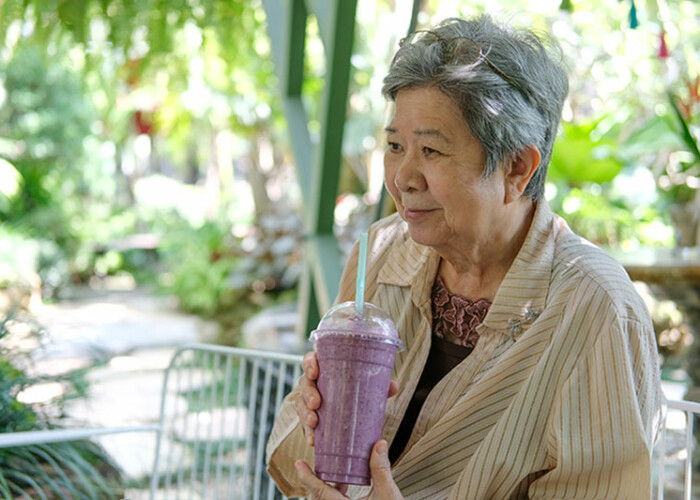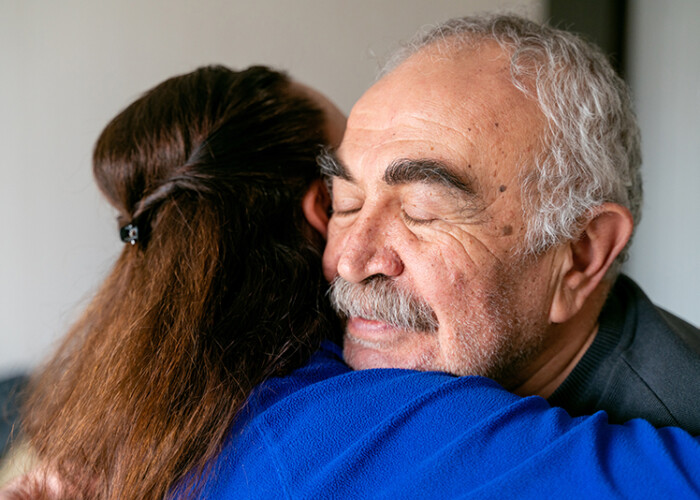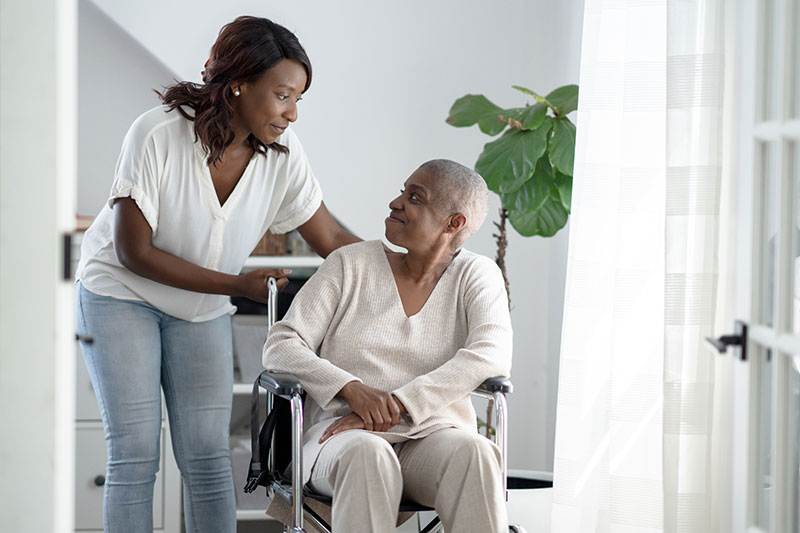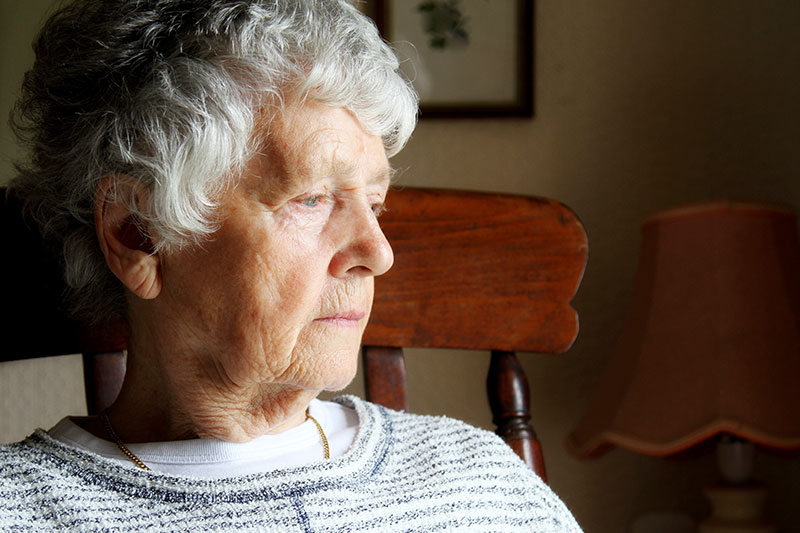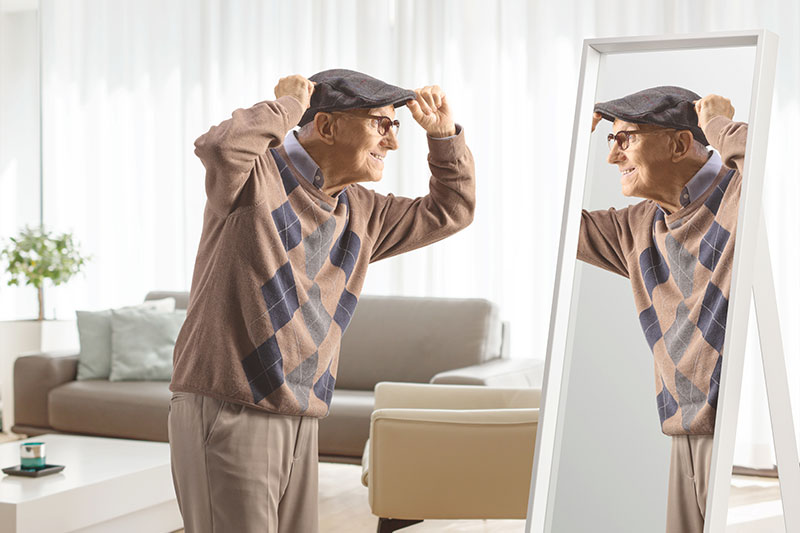Benefits of Home Care
Dysphagia Tips: Using Beverage Thickeners for Swallowing Disorders
These dysphagia tips will help someone you love adapt to beverage thickeners.
Unless you have dysphagia, a swallowing disorder, it is likely you have not given much serious thought to the various textures and consistencies of the liquids in your daily diet. When you are feeling thirsty, nothing hits the spot like an ice-cold glass of water. On a hot summer day, you may crave a cool milkshake. And when you are recuperating from the flu, a warm bowl of soup really hits the spot.
Steps to Boost Socialization for Introverted Seniors
Try these creative ideas to improve socialization for introverted seniors.
Prepare yourself…the holidays will be here before we know it! Although there are plenty of people who flourish on the hectic pace of celebrations and parties, there are others who balk at the thought of going outside of their comfort zone and into more intensive social obligations. It may simply come down to one integral difference: introversion vs. extroversion. And it is important to know which distinction the seniors in your life lean towards more. Socialization for introverted seniors is just as important as for extroverted seniors, and finding the right type of socialization to help them feel most comfortable is key.
What Is Parkinson’s Wellness Recovery and Is It Right for Someone I Love?
Learn about Parkinson’s Wellness Recovery to see if it might be helpful for someone you love.
For individuals living with Parkinson’s disease, the challenges of managing balance, mobility, and overall movement can be profound. As the disease progresses, these difficulties may increase, leading many to assume that less physical activity might be beneficial. However, this assumption is counter to what medical experts and extensive research suggest. In fact, increasing physical activity is strongly encouraged because of its numerous documented benefits in managing Parkinson’s symptoms. In fact, it’s believed to be on par with the adherence to prescribed medications for its role in effective disease management.
How to Be a Partner and Not a Parent as a Spousal Caregiver
We have tips to help you maintain your relationship while being a spousal caregiver.
Healthy, long-term relationships take commitment, sacrifice, and compromise. The happiest relationships are those where both parties selflessly take care of each other. This balance shifts, however, if the person you love experiences a significant health concern. And this shift can have a devastating effect on the dynamics of your relationship if you’re not vigilant, as you find yourself in the role of a spousal caregiver.
It’s natural to want to help your spouse in whatever way you can as their health needs change. However, it’s vital that you ensure you are not sacrificing your romantic connection in the process. Attempting to parent your partner can result in resentment – for both of you. To promote healthy boundaries, keep the following in mind:
• Find … Read More »
Tips to Incorporate Fruits and Veggies into a Senior’s Diet
Learn how to incorporate fruits and veggies into a senior’s diet today!
Most people, including seniors, prefer carbs to carrots. And that can make it challenging to meet a senior’s nutritional needs. The Center for Disease Control and Prevention shares that only one in 10 older adults is meeting the recommendation of at least two servings of fruit and three servings of vegetables each day. Numerous studies have revealed that older adults who do follow these guidelines reduce their risk for heart disease, diabetes, as well as other chronic health issues, and ultimately live longer lives.
When you run into challenges finding a diet that supports a senior’s nutritional needs, you may have to find creative ways to incorporate fruits and veggies into a senior’s diet. For example:
Add a crunch. If the senior loves a crunch, there … Read More »
Senior Technology and How It’s Making It Easier Than Ever to Age in Place
“You are always free to choose what you do with your life. To make changes in your future, make new choices today.” – Brian Tracy
Learn about the latest innovations in senior technology and how they can help someone you love.
Selecting where to reside in our older years isn’t easy. Nearly all older adults prefer to remain at home for a lifetime, but it is not without challenges. Will it be safe? What about mobility issues or other physical limitations? What happens if the person falls and is unable get up?
The good news is, there are a wide variety of solutions that make aging in place possible for older adults. Senior technology, for example, is continually developing and evolving, providing answers to the challenges that could surface as we grow older. Just look at a few … Read More »
Understanding Cultural Competence in the Context of LGBTQ+ Senior Care
The highest quality LGBTQ+ senior care begins with understanding and implementing cultural competence practices.
As we strive to create compassionate and supportive environments for seniors, the concept of cultural competence takes center stage, particularly when addressing the unique needs of LGBTQ+ individuals in their later years. In the context of LGBTQ+ senior care, embracing cultural competence is essential to ensure that each person receives the respect and understanding they deserve as they navigate the intricacies of aging.
What Is Cultural Competence?
At its core, cultural competence refers to the ability of individuals or organizations to effectively interact with people from different cultures. It involves understanding, respecting, and responding to the needs and preferences of individuals from diverse backgrounds. In the context of LGBTQ+ seniors, cultural competence extends beyond a general understanding of aging to encompass the unique challenges, … Read More »
Feeling Overloaded With Caring for a Loved One? These Tips Can Help!
If you’re feeling overloaded with caring for a loved one, we have three simple steps you can take to ease the strain.
If today’s to-dos seem like a lot more than you are able to possibly squeeze into 24 short hours, you are not alone! Family caregivers frequently are feeling overloaded with caring for a loved one and the daily required tasks: Personal care and hygiene. Planning and preparing meals. Medical appointments. Planning activities that are purposeful and enjoyable for the older adult. Shopping and other errands. Housework and laundry. And all of this is on top of meeting the requirements of your own spouse, children, household, and if there is any time left over, yourself!
We invite you to hit the pause button for just a minute, take a deep breath, and put into action these tried-and-true … Read More »
Take These Steps to Avoid Overmedication and Adverse Medication Reactions in Seniors
Taking too much or too little of a medication or taking it the wrong way can lead to adverse medication reactions in seniors.
The days of “take two aspirin and call me in the morning” have morphed into “take two of these…and two of these…and maybe one of those, too!” Nearly forty percent of seniors are taking at least five different prescription medications each day – not to mention vitamins, supplements, and OTC meds. It is easy to understand why overmedication and adverse medication reactions in seniors are extremely common.
Take these actions to avoid medication problems for someone you love:
Make a list, and check it twice. Create a list of every one of the medications – both over-the-counter and prescription – that the person is currently taking. Share the list with all of their healthcare providers, and … Read More »
Why Alzheimer’s Caregivers Say They Need to Go It Alone – And Why It’s a Bad Idea
“You can make it, but it’s easier if you don’t have to do it alone.” – Betty Ford
Alzheimer’s caregivers may feel as though they are the only ones who can provide the best care for an older loved one, but finding a care partner is vitally important.
As a family member caring for a loved one with dementia, you know firsthand how challenging it can be. It’s definitely never a role that Alzheimer’s caregivers should try to fill on their own. Yet, many caregivers struggle with seeking the support they need, intensifying stress and leaving minimal room for self-care, a vital aspect for those in caregiving roles.
See if you can relate to these top reasons given by family caregivers for attempting to provide care solo, and why they need to be reconsidered:
Dad would not want another … Read More »


